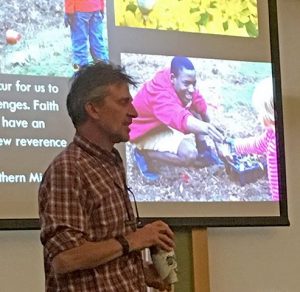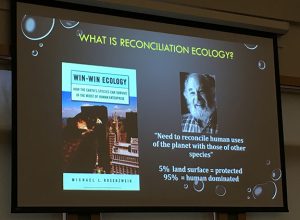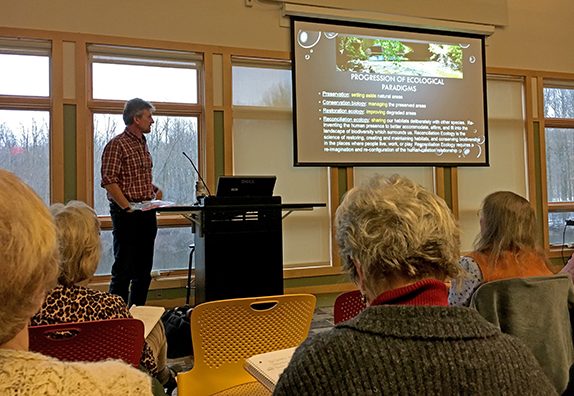River City Wild Ones
April 16 meeting recap by Amanda Welsh, RCWO Communication Committee member
Reconciliation Ecology:
A New Paradigm for Encouraging Biodiversity in Human-Dominated Ecosystems
Dr. David Warners
Biology Department, Calvin College
Co-Director Plaster Creek Stewards
 A New Paradigm
A New Paradigm
Did you know you’re part of a new, emerging paradigm? A paradigm is a way people think about the world they inhabit. You often don’t realize you’re in a paradigm. When paradigms begin to shift, observers may first think the patterns of behavior are strange or working in opposition of the status quo. Then, the shift begins to take on speed and momentum, and those observing become part of the action.
The paradigm shift is David Warners’ premise for illustrating the concept of reconciliation ecology—looking at what’s prevailing versus the shift.
David started his presentation with graphs illustrating the current path we’re on, and the relationship between global temperature, CO2 levels, human population and the prevalence of species extinction. Approximately 50,000 species go extinct annually. In other words, we’re not heading in a good direction.
 But, that doesn’t mean we can?t make improvements. Enter the paradigm shift. David introduced a book, Win-Win Ecology by Michael Rosenzweig, that makes the case for how the majority of the Earth’s surface is dedicated to one species (humans) and asks the question: how can we do better to support and protect the remainder of the species on our planet?
But, that doesn’t mean we can?t make improvements. Enter the paradigm shift. David introduced a book, Win-Win Ecology by Michael Rosenzweig, that makes the case for how the majority of the Earth’s surface is dedicated to one species (humans) and asks the question: how can we do better to support and protect the remainder of the species on our planet?
The answer lies within rethinking the human presence to support other species. By rethinking city design, agricultural practices, transport systems and more, humans can live harmoniously with the natural world creating win-win scenarios for all.

Progression of Ecological Paradigms
As David continued, he outlined the progression of ecological paradigms:
Preservation: setting aside natural, protected areas, such as national parks
Conservation Biology: Managing those preserved areas
Restoration ecology: Improving degraded areas
Reconciliation: the process of deliberately sharing our habitats with other species.
While preserving, conserving and restoring are all critical phases in the progression, equally if not more critical is relearning how humans can live in more sustainable ways. In other words, we will make progress by taking the steps to reconcile our relationship with the environment in which we live. The ecological reconciliation process also has its own progression:
- Recognize what was done (awareness)
- Lament personal complicity (repentance)
- Minimize/repair what was done (restoration)
- Perpetrator asks to be forgiven, offended extends forgiveness (acceptance)
- Agreement to move forward in a new relationship (renewal)
A Reconciliation Ecology Case Study: The Plaster Creek Stewards
The Plaster Creek Stewards (PCS) is a collaboration of Calvin College faculty, staff, and students working with local partners to restore the Plaster Creek watershed. PCS focuses on education, research, and on-the-ground restoration projects.
The Plaster Creek Watershed is 58 square-mile stretch in southeast Kent County. Approximately 20% of Kent County residents live within the watershed. Plaster Creek itself has a complex history and has the sad reputation of being one of the most polluted watersheds in the state.
PCS emerged through Calvin’s awareness of watershed issues in combination with Calvin’s complicity in those issues. By assembling a team of experts, students, and other volunteers, PCS began to work through the reconciliation process and provide sustainable solutions.
One of PCS primary goals is to manage and reduce stormwater runoff, which ends up becoming a large trigger that often exacerbates several other issues including:
- Increased sediment
- Flow dynamics
- Nutrient pollution
- Thermal pollution
- Trash and toxic substances
- Bacterial contamination, including dangerous levels of E. coli.
In addition, PCS is helping residents in the area develop a new relationship with their watershed.
“Restoration is not the goal,” said, David. “Reconciliation is the goal—changing the way people act, live their lives and interact with the creek is the core of what we are trying to do.”
From Standing Water to Bioswales
PCS is involved in a variety of projects, so much so that they are exceeding capacity in their current greenhouses that grow the native plants to fulfill projects. Many projects involve rainscaping, transforming areas such as lawns, curbs and other locations from standing water to urban gardens filled with native plants.
PCS has been installing “curb cut gardens” to collect runoff from parking lot and streets. These urban gardens reduce runoff by catching rainwater, dissipating the energy of the runoff, filtering the runoff and reducing overall runoff volume.
David and the PCS team are also finding that these gardens, which are currently located in a two-acre urban stretch, are retaining a significant amount of water, which means less runoff and damage flowing into Plaster Creek. Through grant dollars, as well as city and community support, PCS intends to grow the curb cut garden program. It requires homeowner approval and agreement that they will assume maintenance of the garden for the long term.
David explained that the key is getting the community involved, getting the people to do the work. It’s all part of the relationship-building aspect.
So how do we know if we’re progressing through the reconciliation ecology process?
“When we plant native plants, we are asking for forgiveness,” said, David. “And when we see and experience biodiversity, the renewal is happening.”?
David’s Recommended Reads
Soul of Nowhere, Craig Childs
Rites of Conquest: The History and Culture of Michigan?s Native Americans, Charles E. Cleland
The Sixth Extinction: An Unnatural Extinction, Elizabeth Kolbert
Moral Ground: Ethical Action for a Planet in Peril, Kathleen Dean Moore, and Michael P. Nelson
Win Win Ecology: How the Earth?s Species Can Survive in the Midst of Human Enterprise, Michael Rosenzweig
Braiding Sweetgrass: Indigenous Wisdom, Scientific Knowledge and the Teachings of Plants, Robin Wall Kimmerer
